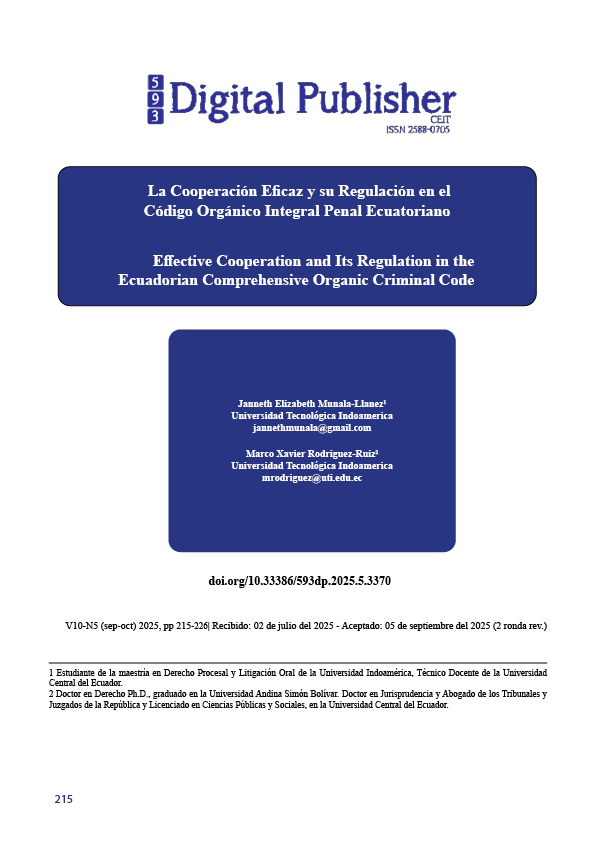Effective Cooperation and Its Regulation in the Ecuadorian Comprehensive Organic Criminal Code
Main Article Content
Abstract
Effective cooperation (EC) is a tool that was incorporated into Ecuador's Comprehensive Organic Criminal Code (COIP) in 2019 as a special investigative technique that helps clarify crimes linked to corruption, drug trafficking, and organized crime. While the legal concept incentivizes defendants to provide truthful and verifiable information, its verification will result in the procedural benefit agreed upon with the prosecutor, which is a reduced sentence depending on the type of case. The overall objective is "to analyze, from a documentary perspective, the relationship between the Metástasis case and the provisions of the COIP, in order to identify gaps in regulatory application and propose reflections on the need to strengthen institutional oversight and transparency mechanisms." The methodology is based on a qualitative approach, utilizing inductive, analytical, and systemic methods, based on a documentary and legal review of the Metástasis case. What I conclude is that the EC is a useful tool in the country because it reveals criminal networks within state institutions. However, I also note a series of regulatory weaknesses, due to potential risks of application leading to impunity, as many officials use this benefit for their own convenience, generating ethical and legal debates about its efficiency and effectiveness. In conclusion, the EC is an ambivalent resource because it offers judicial benefits that help combat organized crime, but it also presents legal violations that could foster legal impunity.
Downloads
Article Details

This work is licensed under a Creative Commons Attribution-NonCommercial-ShareAlike 4.0 International License.
1. Derechos de autor
Las obras que se publican en 593 Digital Publisher CEIT están sujetas a los siguientes términos:
1.1. 593 Digital Publisher CEIT, conserva los derechos patrimoniales (copyright) de las obras publicadas, favorece y permite la reutilización de las mismas bajo la licencia Licencia Creative Commons 4.0 de Reconocimiento-NoComercial-CompartirIgual 4.0, por lo cual se pueden copiar, usar, difundir, transmitir y exponer públicamente, siempre que:
1.1.a. Se cite la autoría y fuente original de su publicación (revista, editorial, URL).
1.1.b. No se usen para fines comerciales u onerosos.
1.1.c. Se mencione la existencia y especificaciones de esta licencia de uso.
References
Asamblea Nacional (2021) . «Código Organico Integral Penal.» Registro Oficial Suplemento 180. 17 de Febrero de 2021. https://www.defensa.gob.ec/wp-content/uploads/downloads/2021/03/COIP_act_feb-2021.pdf.
Bardelini, I., y Vicuña, P. (2021). Análisis de la cooperación eficaz en el Sistema Penal Ecuatoriano periodo 2020. Obtenido de Universidad de Guayaquil: https://repositorio.ug.edu.ec/items/89bf235a-91e7-4e87-a6c7-d33298a6c01d
Benavides, M., Crespo, L., y Sola, M. (2021). La cooperación eficaz del procesado en el derecho penal ecuatoriano. Dilemas contemporáneos: educación, política y valores, 1(40), 1-21. Recuperado el 28 de Febrero de 2025, de https://www.scielo.org.mx/pdf/dilemas/v8n3/2007-7890-dilemas-8-03-00040.pdf
Cobos, J. (2021). La tensión e idoneidad de la cooperación eficaz con la garantías del debido proceso . Obtenido de Universidad Internacional SEK: https://repositorio.uisek.edu.ec/bitstream/123456789/4204/1/Jhon%20Paul%20Cobos%20Rivadeneira.pdf
Correa, J. (2008). La prueba del delito de tráfico de drogas y las diligencias de investigación restrictivas de derechos fundamentales. Obtenido de Universidad Complutense de Madrid: https://dialnet.unirioja.es/servlet/tesis?codigo=184027
Del Rosario, H. (2022). Aplicación de la Cooperación eficaz en el Derecho Procesal Penal ecuatoriano a partir de la vigencia del Código Orgánico Integral Penal por Fiscales y Abogados. Obtenido de Universidad Central del Ecuador : https://www.dspace.uce.edu.ec/server/api/core/bitstreams/b935b90b-68a5-4cd1-8613-530b431deea5/content
Fierro, J. (2020). La cooperación eficaz en el Ecuador, un breve análisis de su aplicabilidad procesal. Obtenido de universidad Católica de Santiago de Guayaquil: http://repositorio.ucsg.edu.ec/bitstream/3317/15690/1/T-UCSG-PRE-JUR-DER-588.pdf
Medina, M. (Mayo de 2022). La cooperación eficáz en el procesopenal ecuatoriano: condiciones legales y procesales para su validez. Obtenido de Instituto de Altos Estudios Nacionales: https://repositorio.iaen.edu.ec/bitstream/24000/6565/1/TRABAJO%20FINAL%20COMPLETO%20-%20MAESTRIA%20IAEN%20%202022-%20MDPPYLO-%20MARLON%20MEDINA%20PULLAS.pdf
Montalvo, F., Montalvo, D., Heredia, R., y Quimba, S. (2023). El crimen organizado y el mecanismo de cooperación eficaz en Ecuador. Cienciamatria, 9(2), 102-111. doi:DOI 10.35381/cm.v9i2.1153
Moran, C. (2023). La cooperación eficaz y la recuperación económica dentro del marco Jurídico Ecuatoriano en relación con otras Legislaciones. Obtenido de Universidad Central del
Tixi, Diego, Mercedes Navarro, Daisy Rojas, y Juan Navas.(2019) «El problema de la delincuencia organizada y la cooperación.» Episteme 6, nº 1 (2019): 772-786.
Zaquinaula, Carlos. (2024) «La cooperación eficaz: límites y riesgos.» Latinoamericana de Ciencias Sociales y Humanidades 5, nº 3 (2024): 2199-2209.



